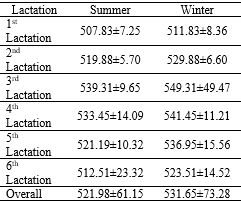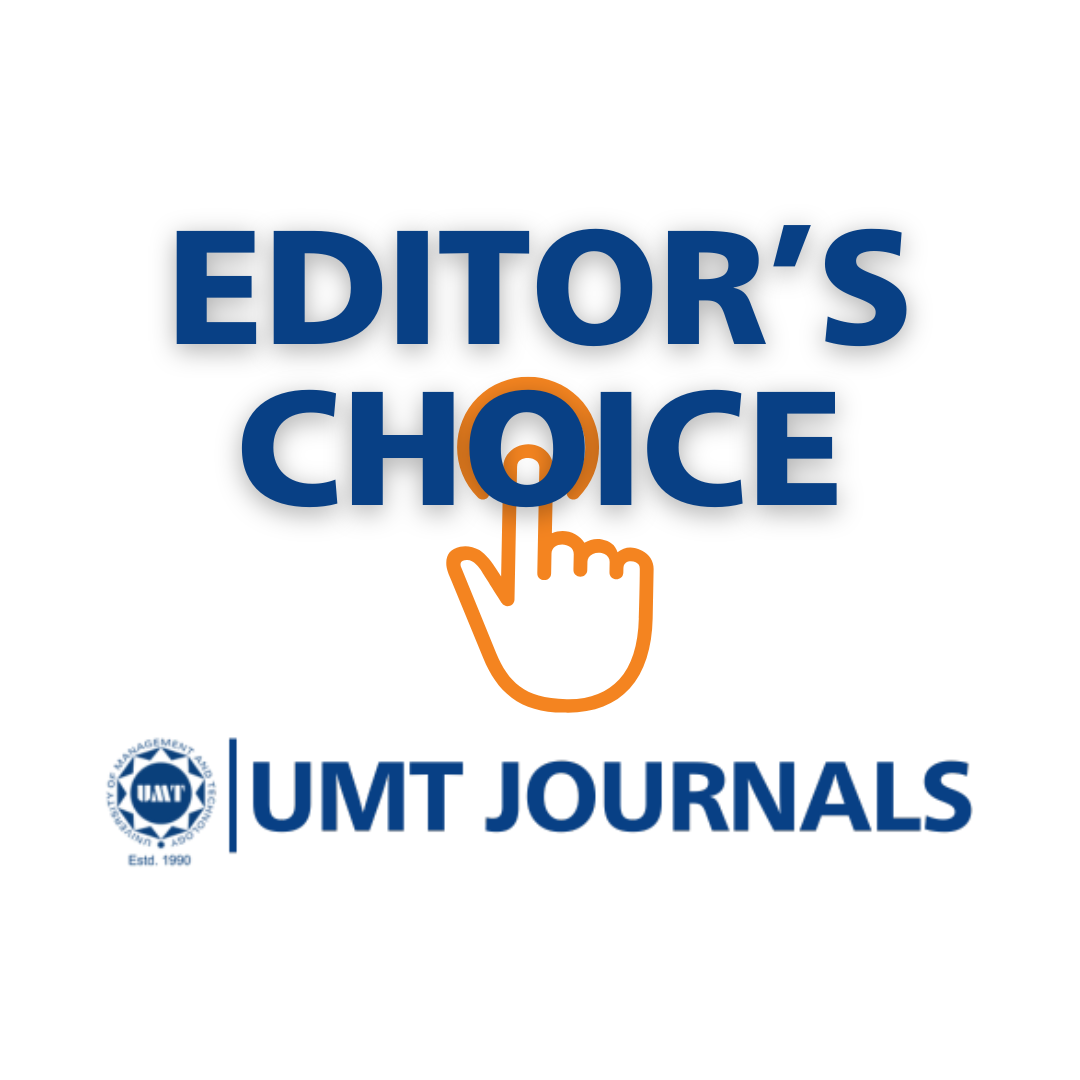Persistency of Lactation, Lactation Yield, and Lactation Length in Thari Cattle at Thari Cattle Farm, Umerkot, Sindh
Abstract
 Abstract Views: 0
Abstract Views: 0
Background. The current study was carried out to determine the persistency of lactation in Thari cattle, in view of the impact of heritability and seasons.
Method. The data on lactation length and lactation yield of Thari cattle (based on their 6 lactations) were collected for the period 2007-2017. To observe the effect of seasons on lactation persistency, the seasons were categorized as summer (April to September) and winter (October to March) for calved cows. The cows were grouped into four categories (A, B, C, and D) based on their sires to analyze the genetic effect on lactation persistency. The data were collected and analyzed using SAS software.
Results. The results for the persistency of lactation revealed that it was higher in 3rd lactation (51.43± 3.85 and 57.00±3.33%) and lower in 1st lactation (39.73± 7.26 and 43.67±5.78%) of summer and winter calvers, respectively. Similarly, sire-wise persistency of milk yield and lactation length was higher in Sire D daughters (1114.33±133.11, 216.4±3.54, and 73.09±7.60) and lower in Sire A daughters (1050.87±66.24, 193.8±7.56, and 58.62±8.10), respectively. Age-wise, it was higher in Sire D daughters 81-25 (61.81 ± 6.31) and lower in Sire A daughters 73-21 (37.39 ± 7.23), respectively. The heritability estimates for milk yield, lactation length, and persistency of lactation were observed as 0.22, 0.21, and 0.11, respectively.
Conclusion. The study found that the season of calving and lactation number significantly affect lactation yield, length, and persistency. On the other hand, there was no significant difference observed with reference to paternity. Lactation yield and length were higher in the 3rd lactation for both summer and winter calvers, while lower in the 1st lactation for both seasons. The heritability of milk yield, lactation length, and persistency was low, suggesting that improvements can be made through better management and by avoiding inbreeding.
Downloads
References
Burgers EE, Kok A, Goselink RM, Hogeveen H, Kemp B, Van Knegsel AT. Effects of extended voluntary waiting period from calving until first insemination on body condition, milk yield, and lactation persistency. J Dairy Sci. 2021;104(7):8009–8022. https://doi.org/10.3168/jds.2020-19914
Chen Y, Hostens M, Nielen M, Ehrlich J, Steeneveld W. Herd level economic comparison between the shape of the lactation curve and 305 d milk production. Front Vet Sci. 2022;9:e997962. https://doi.org/10.3389/fvets.2022.997962
Grayaa M, Vanderick S, Rekik B, et al. Linking first lactation survival to milk yield and components and lactation persistency in Tunisian Holstein cows. Arch Anim Breed. 2021;62(1):153–160. https://doi.org/10.5194/aab-62-153-2019
Keßler F, Wellmann R, Chagunda MG, Bennewitz J. Towards a resilience selection index with indicator traits in German Holstein dairy cattle. J Dairy Sci. 2024;108(1):726–734. https://doi.org/10.3168/jds.2024-25323
Hussain A, Aujla KM, Hassan S. Economics of cow milk production in Sindh and Azad Jammu & Kashmir. Pak J Agricul Res. 2014;1(1):22–27.
Computing Lactation Yield. Procedure 2 Of Section 2 Of ICAR Guidelines-Computing of Accumulated Lactation Yield. Rome, Italy: ICAR; 2017.
Liseune A, Salamone M, Van den Poel D, Van Ranst B, Hostens M. Leveraging latent representations for milk yield prediction and interpolation using deep learning. Comput Elect Agricul. 2020;175(5):E105600. https://doi.org/10.1016/j.compag.2020.105600
Malemela MJ, Nemutandani KR, Tada O. Non-genetic sources of variation influencing yield and composition of milk production parameters in South African Saanen goats. South Afr J Anim Sci. 2025;54(5):620–30. https://doi.org/10.4314/sajas.v54i5.08
Manca E, Cesarani A, Macciotta NP, Atzori AS, Pulina G, Dimauro C. Use of discriminant statistical procedures for an early detection of persistent lactations in dairy cows. Comput Elect Agricul. 2020;176(5):e105657. https://doi.org/10.1016/j.compag.2020.105657
Niozas G, Tsousis G, Malesios C, et al. Extended lactation in high-yielding dairy cows. II. Effects on milk production, udder health, and body measurements. J Dairy Sci. 2019;102(1):811–823. https://doi.org/10.3168/jds.2018-15117
Pedrosa VB, Schenkel FS, Chen SY, et al. Genome wide association analyses of lactation persistency and milk production traits in Holstein cattle based on imputed whole-genome sequence data. Genes. 2021;12(11):e1830. https://doi.org/10.3390/genes12111830
Peiter M, Phillips HN, Endres MI. Association between early postpartum rumination time and peak milk yield in dairy cows. J Dairy Sci. 2021;104(5):5898–5908. https://doi.org/10.3168/jds.2020-19698
Salamone M, Adriaens I, Vervaet A, et al. Prediction of first test day milk yield using historical records in dairy cows. Animal. 2022;16(11):e100658. https://doi.org/10.1016/j.animal.2022.100658
Sehested J, Gaillard C, Lehmann JO, et al. Extended lactation in dairy cattle. Animal. 2019;13(S1):s65–s74. https://doi.org/10.1017/S1751731119000806
Torshizi ME, Mashhadi MH, Farhangfar H. Different aspects of lactation persistency in dairy cows. Indian J Anim Sci. 2019;89(6):607–614.
van Knegsel AT, Burgers EE, Ma J, Goselink RM, Kok A. Extending lactation length: consequences for cow, calf, and farmer. J Anim Sci. 2022;100(10):eskac220. https://doi.org/10.1093/jas/skac220
Zamorano-Algandar R, Sánchez-Castro MA, Hernández-Cordero AI, et al. Molecular marker prediction for days open and pregnancy rate in Holstein cows managed in a warm climate. Lives Sci. 2021;250:e104536. https://doi.org/10.1016/j.livsci.2021.104536
Zurwan A, Moaeen-ud-Din M, Bilal G, Khan MS. Estimation of genetic parameters for persistency of lactation in Sahiwal dairy cattle. Pak J Zool. 2017;49(3):877–882.

Copyright (c) 2025 Azhar Hussain Kaleri, Hubdar Ali Kaleri, Habibullah Janyaro, Muhammad Anees Memon, Muhammad Awais Memon, Naqeeb Ur Rehman, Dure Shahwar, Mudasar Ahmed Khosa, Rameez Raja Kaleri

This work is licensed under a Creative Commons Attribution 4.0 International License.
BSR follows an open-access publishing policy and full text of all published articles is available free, immediately upon publication of an issue. The journal’s contents are published and distributed under the terms of the Creative Commons Attribution 4.0 International (CC-BY 4.0) license. Thus, the work submitted to the journal implies that it is original, unpublished work of the authors (neither published previously nor accepted/under consideration for publication elsewhere). On acceptance of a manuscript for publication, a corresponding author on the behalf of all co-authors of the manuscript will sign and submit a completed the Copyright and Author Consent Form.










